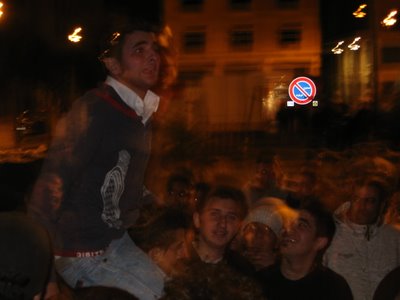Protest or party?

A young Lebanese man, hoisted on the shoulders of his friends, leads chants on Friday night calling for a new Lebanese government. (Among other names, he called the pro-Western Druze leader Walid Jumblatt a donkey, an insult in the Arab World.) The ongoing protest, in downtown Beirut's Marytrs Square, has taken on a carnival-like atmosphere. Some five thousand Lebanese are camped in giant white tents. At night, they sit around bonfires, some singing and chanting, while vendors sell food and souvenirs under a nearby highway overpass.
The protesters -- mostly Shiite Muslim and Christian -- come from Beirut, as well as villages from the far corners of the tiny country. Their tents are painted with the Cedar tree symbol of Lebanon. Both sides in this political struggle (the government coalition is backed by Christians, Sunni Muslims and Druze) have adopted nationalist iconography to boost their claims to power.
What is most remarkable is that such a protest is taking place at all. Lebanon, for all its problems, protects freedom of expression in a part of the world where such freedoms are virtually non-existant. The protestors and their leaders have said they will stay until the government resigns. What happens next is anyone's guess.
On my way home later that night, our taxi driver passed by the protestors and called them zabaleh. Garbage. And who do you support, we asked. I'm Druze he answered, smiling. I'll show you. He flipped open his cell phone, which flashed a photo of Walid Jumblatt.

<< Home